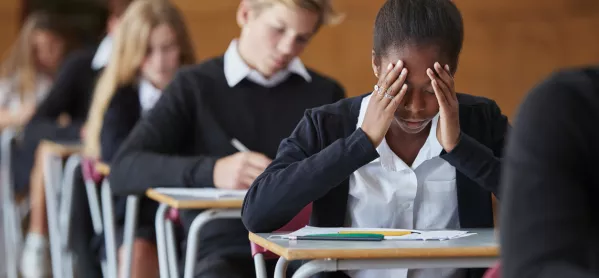Teachers are split over Ofqual and the Department for Education’s plans for the awarding of GCSE and A-level grades this year, a new poll reveals.
The government consultation on exam grading - which proposes that grades be awarded by teacher assessment, with external tasks set by exam boards used as evidence for grading - closed on Friday.
A poll by the Chartered College of Teaching shows teachers are evenly split in their views of the proposals.
GCSEs 2021: Ofqual and DfE plan ‘unworkable’, say heads
Assessment: Heads say no to ‘mandatory mini-exams’
Boris Johnson: Exams won’t happen ‘as normal’
In a survey of its members, the college found that 41 per cent agreed with the proposals, while 41 per cent disagreed and 18 per cent reported they were uncertain.
As part of the poll, Chartered College members were asked about their biggest concerns in Ofqual’s proposals. Consistency, teacher trust and blame, and added workload were all raised by members as concerns.
GCSEs and A levels 2021: Ofqual and the DfE ‘must stand by teachers’
Members said there was a lack of clarity over the proposals, and there was also concern over the external tasks set by boards, or “mini exams”, and whether these differed in any beneficial way from full exams or increased the burden of accountability for teachers.
Over a third of teachers mentioned consistency as the main issue with the proposals. There were concerns over how grades would be arrived at consistently, with many respondents highlighting moderation and standardisation processes as specific worries.
Teachers also raised concerns over the uneven access to learning experienced by many students during the pandemic.
“Some noted that pupil motivation to engage with learning had also dropped since the announcement that exams would be cancelled, leading to further concerns about the learning that would take place,” a statement from the Chartered College said.
Teachers also reported worries over “the workload implications of having to carry out and manage complex assessment processes on top of all the current pressures”.
“Many noted that there seemed to be an expectation that teachers would mark externally set assessments, in essence doing marking that would usually be done by paid exam markers. Many suggested that this would inevitably affect the time being spent on teaching and learning,” the statement said.
Teachers reported that they wanted the external tasks to take place as late as possible to maximise learning time.
On external tasks, “a number of concerns were also raised, including the different levels and areas of content coverage that would have taken place in different schools and the risk of cheating unless all of these assessments were sat at the same time across the country”.
“An issue, noted by some, was accurately assessing pupils, given limited data in some cases, due to how little pupils had been in class this year. In particular, this would be an issue for those who had poor attendance in online learning. The issue of knowing how independently work produced at home had been completed was also raised,” the statement said.
Dame Alison Peacock, chief executive of the Chartered College of Teaching, said: “We welcome the ‘trust teachers not algorithms’ rhetoric. However, there is a definite concern that this sudden desire to trust teachers and hand over the process to them is a smokescreen which leads to the government pointing the finger of blame at the profession come results day.
“A key issue is ensuring not only that this year’s terminal assessment is fair but that everyone understands it to be transparent and clear.
“There can be no ducking of responsibility come August. Ofqual and DfE must stand by our profession.”

